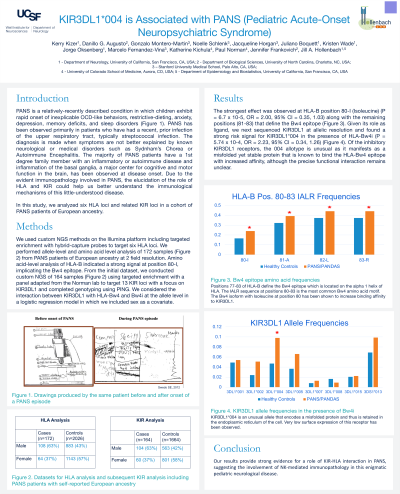(P505) KIR3DL1*004 is Associated with Pediatric Acute-Onset Neuropsychiatric Syndrome (PANS)
Location: Platinum Ballroom

Poster Presenter(s)
Body: Pediatric Acute-Onset Neuropsychiatric Syndrome (PANS) is a relatively recently-described condition in which children exhibit sudden and inexplicable behavioral changes characteristic of obsessive-compulsive disorder and is often accompanied by disordered eating or difficulty completing daily tasks. PANS has been associated with other autoimmune diseases and is observed most often in patients who have experienced a recent, prior infection or inflammation of the upper respiratory tract. The disease course of PANS has been defined as relapsing-remitting and given the apparent immunologic underpinnings in PANS, we sought to elucidate the role of immunogenetic variation in this little- understood disease. We genotyped 168 PANS cases with European ancestry for six HLA loci (HLA-A, -B, -C, -DRB1, -DQB1, and -DPB1) and compared the results at the allele and amino acid level to 2026 previously genotyped ancestry-matched healthy controls.
Conclusion: The strongest effect was observed at HLA-B position 80-I (Isoleucine) (p = 0.003, OR = 2.51, 95% CI = 1.57, 4.09) along with the remaining positions (81-83) that define the Bw4 epitope. Given its role as ligand, we next sequenced KIR3DL1 at allelic resolution and found a strong risk signal for KIR3DL1*004 in the presence of HLA-Bw4i (p = 1.6 x 10-5, OR = 2.71, 95% CI = 0.54, 1.45). Of the inhibitory KIR3DL1 receptors, the 004 allotype is unusual as it manifests as a misfolded yet stable protein that is known to bind the HLA-Bw4 epitope with increased affinity, although the precise functional interaction remains unclear. Our results provide strong evidence for a role of KIR-HLA interaction in PANS, suggesting the involvement of NK-mediated immunopathology in this enigmatic pediatric neurological disease.
Conclusion: The strongest effect was observed at HLA-B position 80-I (Isoleucine) (p = 0.003, OR = 2.51, 95% CI = 1.57, 4.09) along with the remaining positions (81-83) that define the Bw4 epitope. Given its role as ligand, we next sequenced KIR3DL1 at allelic resolution and found a strong risk signal for KIR3DL1*004 in the presence of HLA-Bw4i (p = 1.6 x 10-5, OR = 2.71, 95% CI = 0.54, 1.45). Of the inhibitory KIR3DL1 receptors, the 004 allotype is unusual as it manifests as a misfolded yet stable protein that is known to bind the HLA-Bw4 epitope with increased affinity, although the precise functional interaction remains unclear. Our results provide strong evidence for a role of KIR-HLA interaction in PANS, suggesting the involvement of NK-mediated immunopathology in this enigmatic pediatric neurological disease.

